Cats use of litter box determined by sight, not scent
You might think your cat’s litter box is clean , even if they have already used it. Research shows, however, that cats use of litter box is determined by sight, not scent
Cat toileting habits
Cats are so clean. They come litter trained as kittens. They continue to confine their waste to your backyard or that litter tray that you secrete away in some undisturbed corner of your home. Most owners clean the box regularly, as this prevents that odour that we all want to avoid.
Litter box issues
Of all cat problems, however, litter box woes are by far the most common. Generally we consider these to be due to urinary tract issues, stress or hardware dislikes (litter type, box size, tray location etc). In multi-cat households, toileting outside of the litter box is even more common than solitary feline family situations. Toileting issues are so common that I even wrote a book about them!
Tips to Encourage Cats Use of Litter Tray
The more we know about the cat toileting situation the better! Yes, really! We want to know about cat pee and cat poo!
So scientists have been examining exactly what cats are reacting to, when they refuse to toilet inside their litter tray. Here’s what they found:
Keep the litter clean
Cats prefer to eliminate in unused litter boxes over used litter boxes. In other words, have a clean litter tray every time a cat needs to urinate or defecate. With a multicat household, this generally requires a lot of litter trays!
Interestingly, the presence of urine and faeces produced by another familiar cat, did not affect the cats’ use of the tray. They were as likely to use (or not use) the tray when another cat had previously used it, as when they had used it themselves. This contradicts previous beliefs that cats need a litter tray of their own to use, not their con-specifics.
Read: Rules for cat litter box
Cats use of litter box determined by Visuals or Scents
We might imagine that cats are turned off by the scent of another cat’s waste products already in the tray. There is, of course, also the visual impact of seeing clumps of litter, logs of poo or wet patches of urine.
To test visual and scent impacts individually, the scientists introduced:
(i) isolated scents of feline waste (urine separated from faeces) and put these within the litter tray with no visuals.
(ii) visuals including wet patches of simulated urine and logs of fake poo – faux-urine and faux-fecal material.
When presented with a litter box containing only the waste odours from a familiar cat, cats showed no significant preference for where to either urinate or defecate. However, when presented with a litter box containing the visual stimulus, fake pee and poo, some preferences emerged.
Cats preferred a clean litter box in all cases in which this was presented as an option. When presented with a litter box containing fake urine clumps or one containing fake poo, cats preferred to eliminate on the fake poo whether urinating or defecating.
“Clean your litter tray, especially if it contains cat pee.”
So, clean your litter tray, especially if it contains cat pee. Your cat may be more inclined to use it when poo is present, not pee. This may explain why so many cats urinate in their tray then defecate just outside it.

Why cats show avoidance of visual waste
Just why cats avoid visual toileting stimuli (signs of urination and defecation), is unclear. It may be that they are avoiding higher status cats, who have a greater tendency to leave their waste products uncovered.
Alternatively, existing waste products could be a deterrent to a cat’s natural digging and covering behaviour. Rather than soil their paws on existing waste, cats choose to eliminate elsewhere.
Does your cat have different preferences?
This study was conducted with cats who were familiar with one another and who had been desexed (neutered/spayed). Results may differ in entire animals or with animals who are unfamiliar with one another.
Why is understanding cats use of litter important?
Inappropriate feline elimination (toileting out of the litter box) is cited as the number one behavioral reason owners relinquish cats to shelters. So the more we know about preventing this issue, the more likely cats are to remain in their homes.
No one likes to use a dirty toilet, so we owe it to our pet cats to understand their needs.
What is your cat’s experience of using a litter tray?
More on cat toileting behaviour
Original study
Cat toileting issues
Examining (with Dr Jo’s bare hands!) different types of litter:
Cat Toileting Problems Solved
An easy-to-understand book, helping you solve your cat toileting issues.
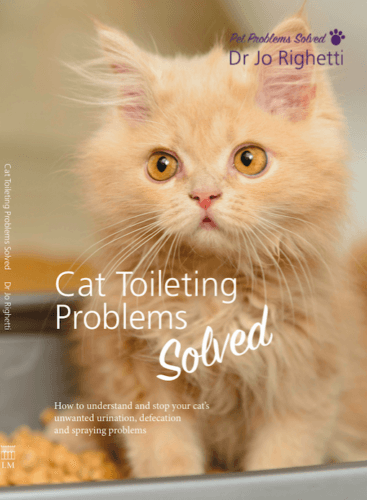
More cat behaviour problems solved
- Cleaning Up Pet Toileting Accidents
 Cleaning up pet toileting accidents Tips for Cleaning up Pet Pee and Poo Toileting Problems Around Your Home ‘Accidents’ around the home need to be cleaned up
Cleaning up pet toileting accidents Tips for Cleaning up Pet Pee and Poo Toileting Problems Around Your Home ‘Accidents’ around the home need to be cleaned up - Top 10 Problem Pets – and Problem Pet Behaviour
 Are you frustrated, angry or puzzled y your pet’s behaviour? Here’s your guide to the top 10 problem pets and problem cat behaviour and dog behaviour…
Are you frustrated, angry or puzzled y your pet’s behaviour? Here’s your guide to the top 10 problem pets and problem cat behaviour and dog behaviour… - Ask Dr Jo – Your Cat Q&As (With adorable Cats to watch!)
 Ask Dr Jo – Your Cat Q&As in the Fancy Feast Lounge Enjoy our cat videos, and get your feline questions answered, in my series of Cat
Ask Dr Jo – Your Cat Q&As in the Fancy Feast Lounge Enjoy our cat videos, and get your feline questions answered, in my series of Cat - Australia’s cats kill 650 million reptiles a year!
 At Pet Problems Solved, we LOVE cats. But cats hunt, it’s inevitable. Indoors they hunt toys, food or us. Outdoors they hunt wildlife. New research, explained in
At Pet Problems Solved, we LOVE cats. But cats hunt, it’s inevitable. Indoors they hunt toys, food or us. Outdoors they hunt wildlife. New research, explained in - How to Keep Pets Calm in Stressful Situations
 All pets get stressed at times and some are in a constant state of anxiety, so it helps to know how to keep pets calm in stressful
All pets get stressed at times and some are in a constant state of anxiety, so it helps to know how to keep pets calm in stressful - Cats use of litter box is determined by sight, not scent
 Cats use of litter box determined by sight, not scent You might think your cat’s litter box is clean , even if they have already used it.
Cats use of litter box determined by sight, not scent You might think your cat’s litter box is clean , even if they have already used it. - Pets and water sprays: No way!
 Pets and water sprays People often tell me that they use a water spray to correct their pet’s behaviour. They say it works, as the pet stops
Pets and water sprays People often tell me that they use a water spray to correct their pet’s behaviour. They say it works, as the pet stops
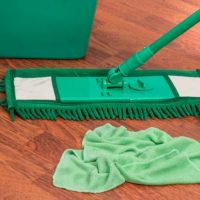

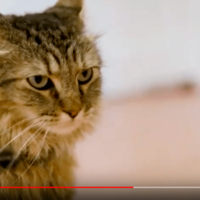


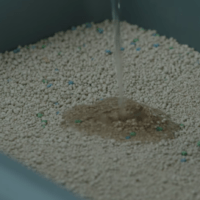


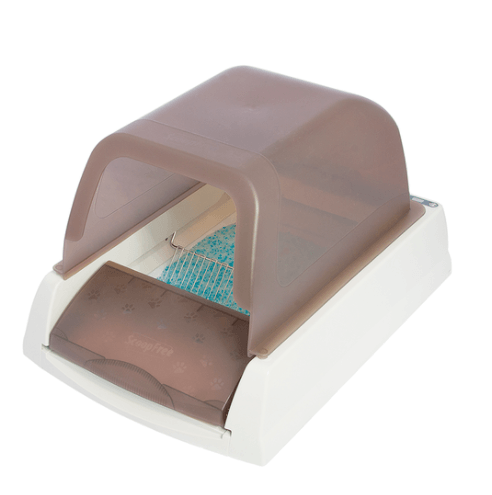



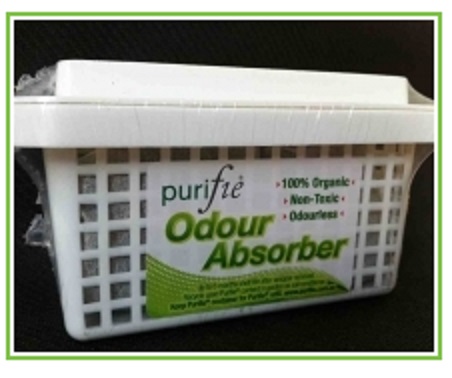
Charlie waits until I sift the litter tray (we use the Oz Pet system) before he’ll get in and use it. Sofia doesn’t seem too bothered although has done a few wees outside of the tray.
Lately my 5 year old ginger is pooing outside the litter tray, he stands in the litter tray but his backside ends up doing it on the floor, I have it in the bathroom so thats a plus but not sure why he’s doing this all of a sudden instead of inside the litter tray 🙁
Interesting how they have individual preferences.
We always thought it would be scent that deterred them but it seems to be sight.
Usually this happens because the litter tray is just not big enough. Try a bigger one or one with a lid.
Also have a vet check to check that it’s not arthritis or another ailment causing him to squat differently.
Or perhaps, if the tray is soiled already, he may be avoiding an area of it.
Jo
I did buy a bigger one Jo as he was doing it with the other one which was smaller and I clean up pee and poo whenever he has used the litter tray, so maybe a trip to the vet 🙁 dread that as he poops in the carry cage cause he is so scared…sigh.
Em Rainsford
For you this morning Ross Craig
🙂
We have an old cat – no UTI – kitty litter tray always clean (like i clean it after every wee) but she insists on weeing on the carpet in different places! Help!